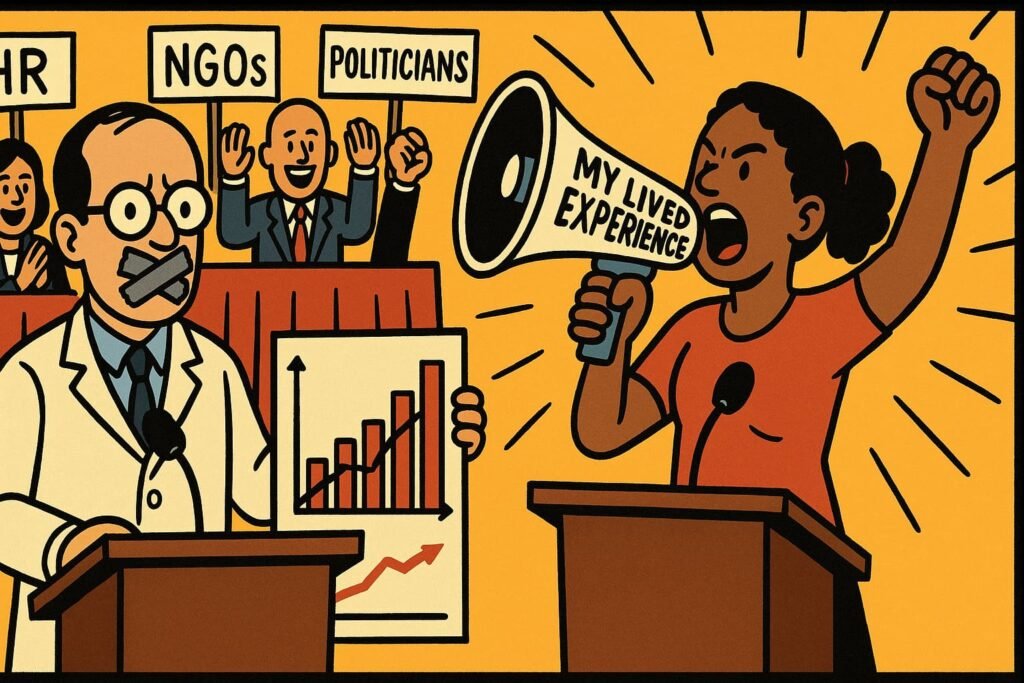Lived Experience Explained – Feelings Over Facts
When Anecdotes Become Evidence
In normal conversation, sharing your story is valuable. It adds colour and perspective.
But in activist jargon, lived experience has been elevated from personal story to unquestionable truth. If someone claims oppression, their feelings override facts, logic, or evidence. Debate over.
It’s not empathy. It’s a veto.
Table of contents
What Is Lived Experience?
Traditionally, it meant personal knowledge from direct experience.
In Critical Theory and social justice activism, lived experience now means your identity-based perspective is more valid than objective evidence. A white male scientist with data must step aside for a minority activist with a story.
The story wins every time.
Buzzwords
The concept comes with familiar phrases:
- “Centering voices” – Prioritise stories from approved groups.
- “Validate my truth” – Feelings elevated as facts.
- “Silence is violence” – Refusing to endorse someone’s story = oppression.
- “Standpoint epistemology” – The academic term for truth by identity.
It’s not just storytelling. It’s storytelling as law.
How It Shows Up in Practice
- Universities grade essays on “lived experience” alongside research.
- Workplaces use identity testimonials to shape policy.
- Media treats anecdotes as proof of systemic bias.
- Politics elevates personal narratives over statistics in debate.
Lived experience becomes both evidence and conclusion.
Why Institutions Promote It
Because it’s easy and unchallengeable.
- NGOs raise money by telling victim stories.
- Universities justify programs around “decolonising knowledge.”
- HR departments rely on testimonials to drive DEI reforms.
- Corporations use personal narratives in branding to signal virtue.
Lived experience can’t be audited, which makes it perfect for industries built on grievance.
The Consequences
- Truth fractured. Everyone has “their truth,” but no shared reality.
- Debate silenced. Questioning a story = invalidating a person.
- Policy skewed. Laws shaped by feelings, not outcomes.
- Resentment grows. Ordinary people see it as manipulation.
Ironically, privileging lived experience often erases other people’s experiences that don’t fit the narrative.
Why It Matters
Lived experience reshapes how truth is defined. It shifts society from universal principles to subjective authority — and that authority is handed to activists, consultants, and institutions.
It’s not just empathy. It’s power.
From Empathy to Epistemology
Sharing stories builds empathy. But turning stories into unquestionable evidence corrupts knowledge itself.
Lived experience promised compassion. What it delivered was a new dogma: feelings over facts.
FAQ
What does lived experience mean in plain terms?
It’s the idea that personal stories, tied to identity, carry more weight than data or debate.
Why is lived experience controversial?
Because it elevates feelings over facts and silences disagreement.
Who benefits from this culture?
NGOs, activists, universities, and corporations that profit from grievance politics.
How does lived experience link to Critical Theory and DEI?
It’s rooted in standpoint theory from Critical Theory and fuels DEI policies. See also: Intersectionality Explained, Inclusion Explained, Allyship Explained.



